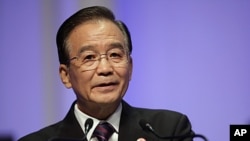China is preparing to face down regional criticism, including its South China Sea territorial claim, later this week at a series of Asian summits. During a news briefing Tuesday Assistant Chinese Foreign Minister Liu Zhenmin attempted to cool anxiety about rising regional tensions.
Chinese Premier Wen Jiabao will travel to Bali, Indonesia, Thursday for a round of annual summits where he is expected to hear demands from some of China's neighbors to discuss competing claims to the South China Sea.
But Assistant Foreign Minister Liu Zhenmin said Tuesday China does not want to discuss the issue.
He says he wants to make it clear to the other countries in the region that the South China Sea issue has nothing to do with the East Asia Summit, which follows a gathering of Southeast Asian leaders at the annual ASEAN meeting.
Liu says the summit is a forum for discussing economic and trade development issues. He says China prefers to discuss territorial claims individually with the countries involved rather than collectively discuss them.
He also warned against efforts to involve outside countries, such as the United States, in the territorial dispute.
Liu says any such intervention would, in his words, only complicate the issue and sabotage regional peace, stability and development.
New reports from the Philippines indicate that Benigno Aquino is planning to publicly press for talks on the South China Sea dispute at the two-day East Asian Summit in Bali.
Other ASEAN member countries, including Brunei and Malaysia, as well as Beijing's rival Taiwan, also claim to own all or part of the Spratlys Islands close to important shipping lanes in the South China Sea.
Those shipping lanes are also a priority for Washington, which claims it has a stake in the security and what it describes as unhampered international commerce in the South China Sea.
Li Mingjiang is an assistant professor at the S. Rajaratnam School of International Studies in Singapore and an specialist on East Asian regional relations and Sino-American ties.
He says Beijing will be unhappy that some of its regional neighbors are seen to be moving closer to the United States for security cooperation and security ties.
"The South China Sea issue will be brought up and will be discussed, but again a lot of these things will be diplomatic and symbolic. There will be some sort of diplomatic tug of war but it's not going to resolve onto any open confrontation. I think Beijing understands that this is something that China has to handle carefully. It cannot openly criticize these regional states because any criticism will only backfire," he stated.
Li also points out that those countries upset with China also have to be diplomatic, given the growing trade dependency with Beijing.
"Obviously, regional states will have to consider Chinese reactions, if they move too fast or too close to the U.S. The number-one concern will be economic interests, because a lot of the regional states now depend on China for economic development. If you look at the trade flows, it is clearly the case," Li said.
Chinese Foreign Minister Liu was keen to point to out how increasing trade between ASEAN countries and China was helping to offset the dip in demand from the financially troubled U.S. and European markets.
China’s role in the United States’ economic troubles was raised earlier this week when President Barak Obama said China has not done enough to allow its currency to reach a fair-market value.
Chinese state media criticized the remarks, saying the U.S. president was blaming China for his country’s economic problems. When the foreign minister was asked about what he thought the U.S. president meant by his words, the foreign minister said only the White House could explain the remarks.










